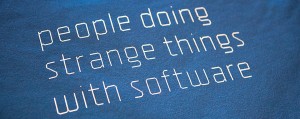In an e-book by Metahaven the design and research collective asks, “can jokes bring down governments?” Perhaps, a better way of putting it would be to replace “governments” with “major corporations”; those capitalist puppet masters behind impotent governmental bodies who’d sold us out to the private sector or what Mark Fisher calls the “nebulous, unaccountable interests exercising corporate irresponsibility” in his Capitalist Realism. Of course, political satire as a subversive act, ridicule as a weapon against equally absurd oppressions, is nothing new. Except that all that is “political” becomes “corporate” and that is nowhere more apparent than in the debate surrounding the Tim Wu-coined concept of “net neutrality”.
That’s the subject of the half-hour mockumentary LEAKED: The Internet Must Go, featuring “market researcher” John Wooley, who spends 45 days pursuing and interviewing some of the most notable US proponents of an “open internet”, including the likes of US Democrat Al Franken, former tech advisor to Obama Susan Crawford, Public Knowledge digital advocacy group and, of course, Wu himself, who are all subjected to the clueless questioning of the Wooley persona. He’s investigating on behalf of his corporate employers, namely Verizon, AT&T, Time Warner and Comcast –all major service providers pushing to monetise broadband speeds, by implementing a tiered program where content producers and consumers alike will be required to pay for ease of access to their information.
Dubbing it a “vision for a ‘faster’, ‘cleaner’ internet” Wooley explores and slowly becomes disillusioned by his corporate employers’ ends to data discrimination in an effort to maximise profits, eventually leading him to append the note “Also, I’m looking for a job — any leads would be appreciated, thank you” on his LEAKED: The Internet Must Go YouTube post. That’s because this idea of charging for speed of access is an issue, not just because it means denying access to basic infrastructures (Wu likening curbed connectivity to a public bridge, where Pizza Hut pays a sum to cross and make deliveries, while a smaller company who can’t afford the toll will be put out of business) but basic freedom of speech: “you shouldn’t think about ‘free’ in the sense of free beer, you should think about ‘free’ in the sense of free speech”, says Harvard academic and activist Larry Lessig, illustrating the consequences of start up enterprises being forced to join bigger ones and toe the party line, in exchange for exposure. Appearances by Zip Car founder Robin Chase and Ricken Patel of global civic activist organization avaaz.org iterate that they might never have existed if not for a neutral internet.
Whether the internet is ever truly democratic is arguable, with a complex interaction of browser speeds, operating systems, issues of planned obsolescence –as illustrated by Nick Briz’ Prosumer Manifesto released earlier this year -and basic access to hardware coming into play. But, here, basic access to broadband and the impact it can have on the development of an entire region is illustrated by a trip to Southern US, where school children are forced to do their homework on a busy major highway dubbed “Death Hill” because it is a high spot for 3G connection speeds. That’s also not to say everyone should have a right to the pipes, built by companies providing the internet, but when a ban on any community-built broadband infrastructure is successfully implemented in several US states because “it was unfair to the ISPs”, without providing their own in its stead, for lack of a population to sell to, that’s when someone should be held accountable for the monopoly lobbied for by, what MoveOn.org’s Eli Pariser calls, the “old media”.
It’s true that broadcast networks are also highly regulated (much to the chagrin of countless pirate radio stations) but as internet culture and our dependence on it becomes ubiquitous, particularly in ‘developed’ economies, a monetised program for rationing broadband speeds becomes an issue of limiting the rights of the individual to level of access: freedom of speech and movement becomes a privilege you have to pay for.
The idea of a liberal democracy is founded on the assumption that each and every one of us is born with the same rights and opportunities; that age-old (and rather optimistic) adage of a “level playing field”. As that “field” is transferred to the online domain and access to it costs money, there are a lot of people who will be competing at a huge disadvantage. And that’s a joke with some pretty serious consequences. **



















